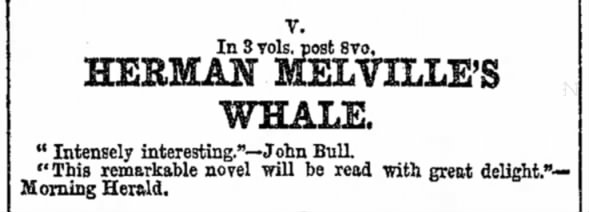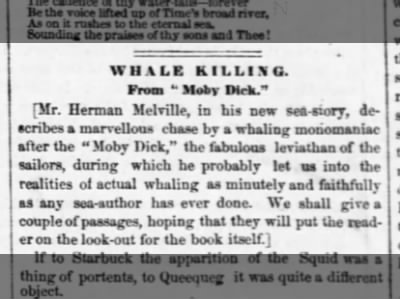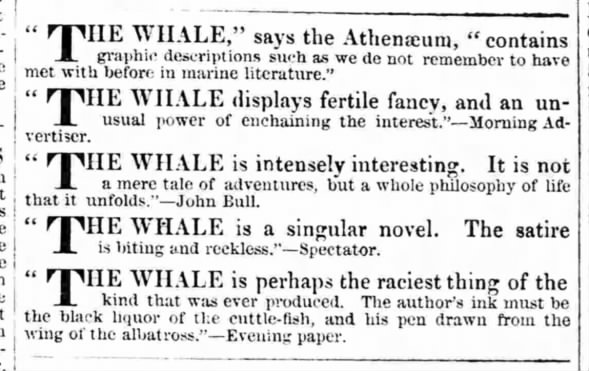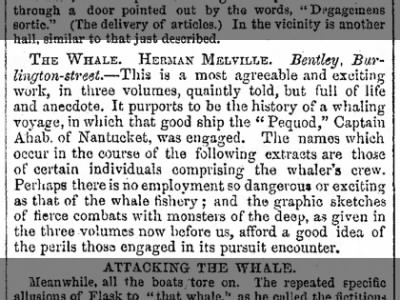Widely panned is a 21st century twist, better describing the disappointment of critics with
Mardi or
Pierre, but with the virtue of being at least geographically defensible when repurposed for
Moby-Dick (panned from Charleston to Boston, and on both sides of the Atlantic). Otherwise, the idea "that the reviewers demolished
Moby-Dick" was already considered a "legend" in 1938 when Willard Thorp fact-checked it in the introduction to
Herman Melville: Representative Selections. The legend continues in spite of scholarly interventions--attempted by John C. McCloskey in "
Moby-Dick and the Reviewers,"
Philological Quarterly 25 (October 1946) pages 20-31; and, more persuasively, by Hugh W. Hetherington in “Early Reviews of
Moby-Dick,”
Moby-Dick Centennial Essays, ed. Tyrus Hillway and Luther S. Mansfield (Southern Methodist University Press, 1953), pages 89–122. In 1982, Steven Mailloux again surveyed the transatlantic reception of The Whale/Moby-Dick, explaining that
"Such a survey is needed to counteract past claims about a predominately negative reaction from contemporary reviewers." --Interpretive Conventions: The Reader in the Study of American Fiction (Cornell University Press, 1982) page 171.
Recent variations on the theme of
Moby-Dick as critical failure in the 19th century:
- At first, Moby Dick was a total flop --Chris Gaylord, Christian Science Monitor, October 18, 2012. <https://www.csmonitor.com/Technology/Tech-Culture/2012/1018/Herman-Melville-books-At-first-Moby-Dick-was-a-total-flop>
- Zack Bivins, The eNotes Blog. 5 Reasons to Reread Moby-Dick. "Moby-Dick was widely panned in both England and the United States—Melville’s experimental style flew over the heads of most critics." <https://blog.enotes.com/2018/10/17/5-reasons-to-reread-moby-dick/>
- Philip Hoare in The Guardian, July 30, 2019. Subversive, queer and terrifyingly relevant. "The first version of the book was published in Britain in 1851, entitled The Whale. It came out in the US later that year as Moby-Dick – and failed, miserably." <https://www.theguardian.com/books/2019/jul/30/subversive-queer-and-terrifyingly-relevant-six-reasons-why-moby-dick-is-the-novel-for-our-times>
Internet revival of the old rejection-legend has motivated me to conduct a new poll. The mission: count and sort known contemporary reviews and notices of
Moby-Dick into the broad categories of
- Favorable or positive
- Unfavorable or negative
- Mixed
Necessarily, this effort of mere counting will disregard Hershel Parker's 1975 advice not to copy Hetherington's method (in
Melville's Reviewers, British and American, 1846-1891) of "keeping box scores" of favorable or unfavorable reviews. For context see Parker on
Being Professional in Working on Moby-Dick,
College Literature Volume 2 Number 3, Moby-Dick (
Fall, 1975) pages 192-7 at 195. That's just what I want now, a simple box score. Here I won't be too concerned about literary merit or depth of analysis or the reviewer's aesthetic sensibility. For that matter, I don't even care if the reviewer read
Moby-Dick or not. Nor will I evaluate the influence that any particular review may have had on Herman Melville. Or explore the way that haters, especially conservative and religious types, understood what Melville wrote better than sympathizers. For those really interesting and important considerations, get the 1988 Northwestern-Newberry Edition of
Moby-Dick, or The Whale and read Parker on the British reception of
The Whale, and American reception of
Moby-Dick, in the Historical Note, section VII, pages 689-732. Parker's essential work there is wonderfully reprised in the opening chapter of
Herman Melville: A Biography Volume 2, 1851-1891 (Johns Hopkins University Press, 2002) on pages 17-30.
It's true that
Moby-Dick received severe criticism when first published in 1851, some of it in influential periodicals like the London
Athenaeum ("so much trash") and Boston
Post ("not worth the money asked"). To Herman Melville, personally, the most hurtful review of all had to have been the pious and condescending hit piece delivered by his close friends Evert and George Duyckinck in the "Second Notice" of
Melville's Moby-Dick; or, The Whale, published on November 22, 1851 in the New York
Literary World.
https://books.google.com/books?id=ADwZAAAAYAAJ&pg=PA403&dq#v=onepage&q&f=false
That attack on
Moby-Dick as tedious and irreligious came as a sucker punch after the mildly approving First Notice published the week before ("no everyday writing, and in Herman Melville's best manner"). Hawthorne complained in a
letter to Evert A. Duyckinck, but the Duyckincks had already consolidated both notices into one long review, reprinted from the
Literary World in the December 1851 issue of
Holden's Dollar Magazine.
https://books.google.com/books?id=11jaUnGl52cC&pg=PA267&dq#v=onepage&q&f=false
So clearly a handful of negative reviews can matter more than a boatload of positive ones. Parker keys on the bad ones in his examination of influential "Make-or-Break-Reviews" for
Herman Melville in Context, ed. Kevin J. Hayes (Cambridge University Press, 2018). Melville (perhaps being "supersensitive," as Hetherington suggests in
Melville's Reviewers) evidently took the worst reviews of
Moby-Dick to heart. In
Pierre (1852), as Parker first discovered in
Why "Pierre" Went Wrong,
Studies in the Novel Volume 8, Number 1 (Spring 1976) pages 7-23 at 14, Melville "was reacting
specifically to the reviews of his latest book,
Moby-Dick." This crucial insight is further developed by Brian Higgins and Hershel Parker in
Reading Melville's Pierre; or, The Ambiguities (Louisiana State University Press, 2006) on pages 150-153.
Nevertheless, this is the year for the
2020 Census, not to mention another Grand Contested Election for the Presidency of the United States. High time then for new and improved tallies. Not only of favorable and unfavorable opinions, since the most thoughtful ones may be mixed. An unbiased scorecard will keep mixed reviews in the "mixed" category, even when jammed with positive ingredients. For example, as Hetherington perceives, the London
Atlas review "mingled great disparagement with great adulation":
The big day for The Whale in London was November 8. Of the four reviews which came out that day, two elaborate ones, in the Atlas and Britannia, are almost impossible to categorize as favorable or unfavorable, for they both mingled great disparagement with great adulation. Also both commenced in much harsher mood than they ended, suggesting that in each case, the reviewer, as he approached the last pages, came gradually, even against his will, to submit to Melville's wizardry.
--Melville's Reviewers: British and American, 1846-1891 (University of North Carolina Press, 1961) pages 193-4.
On the other hand, the excerpt from the London
Atlas in
Harper's Magazine for January 1852 reproduces only the most positive content with a positive spin, and therefore counts as a favorable notice. The positive spin in
Harper's New Monthly Magazine is what enables Jennifer Phegley to take the London
Atlas review as one of "two favorable British reviews" of
Moby-Dick. Citation:
Phegley, Jennifer. “Literary Piracy, Nationalism, and Women Readers in ‘Harper's New Monthly Magazine’, 1850-1855.” American Periodicals, vol. 14, no. 1, 2004, pp. 63–90. JSTOR, www.jstor.org/stable/20770918. Accessed on Mardi Gras Day 2020.
Strictly according to the numbers, as shown below, the majority view of
Moby-Dick was favorable. The favorable reception of
Moby-Dick stands in contrast to generally hostile reviews of Melville's next novel. Even the anonymous critic who slammed
Pierre in the
New York Herald wished Melville had found another whale to write about:
"Is there not a solitary whale left, whose cetaceous biography might have added another stone to the monumental fame of the author of Moby-Dick?" --New York Herald review of Melville's Pierre, September 18, 1852.
Fifty-nine notices of
The Whale and
Moby-Dick; or, The Whale are collected in
Herman Melville: The Contemporary Reviews, edited by Brian Higgins and Hershel Parker (Cambridge University Press, 1995; paperback 2009); and transcribed there on pages 353-415. Of the 59 transcribed reviews, I'm counting 35 as favorable
😍 ; 14 negative
😠 ; and 10 mixed
👍👎 . Good reviews outnumber the bad ones, 35 to 14 or 2.5:1. Even if you wanted to count all the reviews that I deem "mixed" as negative, the positive ones would still win, 35 to 24.
- 😍 "for vigour, originality, and interest, has never been surpassed." London Morning Herald, October 20, 1851.
- 😍 "unusual power of enchaining the interest, and rising to the verge of the sublime" London Morning Advertiser, October 24, 1851. Excerpted in London Globe, "THE WHALE," October 24, 1851.
- 😠 "so much trash." London Athenaeum, October 25, 1851.
- 😍 "extraordinary" London John Bull, October 25, 1851.
- 😠 "rhapsody run mad" London Spectator, October 25, 1851.
- 👍👎 London Atlas, First Notice. November 1, 1851.
- 😍 "Herman Melville's last and best and most wildly imaginative story, 'The Whale.'" Illustrated London News by Angus Bethune Reach, November 1, 1851.
- 👍👎 "If you love heroics and horrors he is your man." London News of the World, November 2, 1851. Same text as the review in Bell's New Weekly Messenger - Sunday, November 2, 1851. Reprinted next day in the London Magnet, November 3, 1851.
- 👍👎 London Atlas, Second Notice. November 8, 1851.
- 👍👎 evincing "rare versatility of talent." London Britannia. November 8, 1851.
- 😠 "...our enjoyment is small even of what we must admit to be undeniably and remarkably clever in it." London Examiner, November 8, 1851.
- 😍 "... no criticism will thwart its fascination." London Leader. November 8, 1851.
- 😍 "despite its occasional extravagancies, it is a book of extraordinary merit." London Morning Post. November 14, 1851.
- 😍 "the production of a man of genius" that "abounds in bright, witty and attractive things." Albany NY Argus. November 14, 1851.
- 😍 "The author writes with the gusto of true genius, and it must be a torpid spirit indeed that is not enlivened with the raciness of his humor and the redolence of his imagination." Morning Courier and New-York Enquirer, November 14, 1851.
- 😍 "bold and stirring"; "written in the author's happiest vein." Troy NY Budget, November 14, 1851.
- 👍👎 Melville "indulges frequently in profaneness, and occasionally in indelicacies, which materially detract from the merits of the book, which exhibits much tact, talent and genius." Boston Evening Traveller, November 15, 1851.
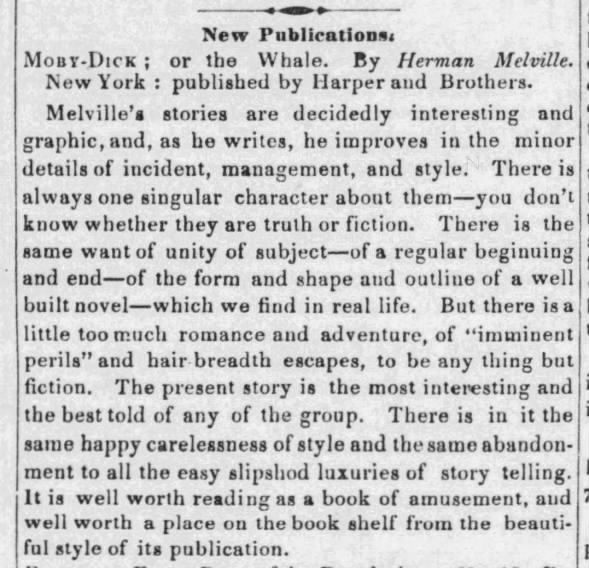 Sat, Nov 15, 1851 – 2 · Hartford Courant (Hartford, Connecticut) · Newspapers.com
Sat, Nov 15, 1851 – 2 · Hartford Courant (Hartford, Connecticut) · Newspapers.com
- 😍 "Melville's stories are decidedly interesting and graphic, and, as he writes, he improves in the minor details of incident, management, and style....well worth reading as a book of amusement, and well worth a place on the book shelf from the beautiful style of its publication." Hartford Courant, November 15, 1851.
- 😍 "no everyday writing, and in Herman Melville's best manner." First notice, The Literary World, November 15, 1851.
- 😍 "possesses all the interest of the most exciting fiction, while, at the same time, it conveys much valuable information in regard to things pertaining to natural history, commerce, life on ship board, &c." New Haven Palladium, November 17, 1851.
- 😍 "What writer is more welcome?" New York Morning Express, November 17, 1851. Based on New York Courier review, #15 above.
- 😍 "Mr. Melville has woven around this cumbrous bulk of romance, a large and interesting web of narrative, information, and sketches of character and scenery, in a quaint though interesting style, and with an easy, rollicking freedom of language and structure, characteristic of himself." Springfield MA Republican, November 17, 1851.
- 😍 "characters and subjects which figure in it are set off with artistic effect, and with irresistible attraction to the reader." New Bedford Mercury, November 18, 1851.
- 😠 "not worth the money asked." Boston Post, November 20, 1851; this notice opens quoting the negative review in the London Athenaeum.
- 😍 "we know of none who can excel him in his delineations of the sea, and the wonders that pass before the eyes of those who traffic thereon." New York Christian Intelligencer, November 20, 1851.
- 👍👎 "Mr. Melville grows wilder and more untameable with every adventure."; The delineation of character, too, is exquisitely humorous, sharp, individual and never-to-be-forgotten." New York Evangelist, November 20, 1851.
- 😠 "Judgment day will hold him liable." New York Independent. November 20, 1851.
- 👍👎 "vivid sketches done in the author's best style." Characterization of Ahab "ruined, by a vile overdaubing with a coat of book-learning and mysticism." Still, "not lacking much of being a great work." New York Albion, November 22, 1851.
- 👍👎 "vivid dashing style of narrative and characterization, that takes one along by force." On the other hand: "We could wish a little less rambling in the story, and a little more reverence in the spirit of the book." New York Christian Inquirer, November 22, 1851.
- 😍 "constructed in Herman Melville's best manner." "..wildly imaginative and truly thrilling story." "We think it the best production which has yet come from that seething brain, and in spite of its lawless flights, which put all regular criticism at defiance, it gives us a higher opinion of the author's originality and power than even the favorite and fragrant first-fruits of his genius, the never-to-be-forgotten Typee." New York Tribune, November 22, 1851.
- 😠 Mixed but mean, coming from a friend: "... we begin to have some faint idea of the association of whaling and lamentation, and why blubber is so popularly synonymous with tears....We do not like to see what, under any view, must be to the world the most sacred associations of life violated and defaced." Second notice by Evert and George Duyckinck in the New York Literary World. November 22, 1851.
- 😠 "even his power of expression, and elegance of style, will not redeem a book from being prosy after the natural interest of its subject has been exhausted. More than five acts of the best tragedy would be too much for mere mortals to bear." Parker's Journal. November 22, 1851.
- 😍 "decidedly the richest book out." Philadelphia American Saturday Courier, November 22, 1851.
- 😍 "We nowhere find a more perfect delineation of character; he has a keen perception of the humorous and grotesque, excels in the description of natural scenery; his pencil is rich in coloring and his mind fertile in invention." Baltimore American and Commercial Advertiser, November 25, 1851.
- 😍 "well sustains his reputation as a tale writer and sketcher, while it enhances in a high degree his fame as an original thinker and illustrator of every day sailor men, and every day sailor scenes." Hans Yorkel (Abraham Oakey Hall), New Orleans Commercial Bulletin, November 27, 1851.
- 😠 "There are few readers who will not be at first repulsed by its eccentricity." ... "We regret to see that Mr. Melville is guilty of sneering at the truths of revealed religion." NY Commercial Advertiser, November 28, 1851.
- 😍 "a wild, weird book, full of strange power and irresistible fascination for those who love to read of the wonders of the deep...among the freshest and most vigorous that the present publishing season has produced." London Weekly News and Chronicle, November 29, 1851.
- 😍 "a very racy, spirited, curious and entertaining book." N. P. Willis, New York Home Journal, November 29, 1851.
- 😍 "The high reputation
attained by Mr. Melville as the author of those admirable works, Typee, Omoo,
Redburn, Mardi, and White Jacket, is fully sustained in the volume which is the
subject of this notice. It purports to give the veritable history of a whaling
voyage performed by one Ishmael. Whether this work be viewed in reference to
the numerous exciting incidents with which it abounds, to the variety and
completeness of the information it conveys as respects the natural history and
habits of this leviathan of the deep, or to those bold, vigorous, and life-like
delineations of character with which the narrative is relieved, certain it is
that Ishmael has presented a most readable work and an intensely interesting
history...." Washington Union, November 30, 1851.
- 😍 "surpasses any of the former productions of this highly successful author." Harper's New Monthly Magazine, December 1851.
- 😍 "Fresh and buoyant as ever, our old friend dashes out in another realm of sea-life...." Newark NJ Daily Advertiser, December 5, 1851.
- 😠 "wantonly eccentric, outrageously bombastic." London Literary Gazette, December 6, 1851.
- 😠 "pitiable to see so much talent perverted to sneers at revealed religion and the burlesquing of sacred passages of Holy Writ." New York Churchman, December 6, 1851.
- 😍"a work of exceeding power, beauty, and genius." New York Spirit of the Times, December 6, 1851.
- 😍 "full of wild adventures and glowing descriptions... just think of chasing the whale, the monster king of the great deep, through the mighty waste of waters!" Savannah Republican, December 6, 1851.
- 😍 "a fair sample of the 'Romance of real life,' and while its tendency is useful and instructive, it is free from those pernicious and deceptive ingredients, with which many of the tales of the present age are impregnated." St. John, New Brunswick News, December 10, 1851.
- 😍 "a prose Epic on Whaling," clearly "the production of a man of genius."
"...ingenious romance, which for variety of incident and vigor of style can scarcely be exceeded." Washington National Intelligencer, December 16, 1851.
- 👍👎 "Here, however--in "The Whale"-- comes Herman Melville, in all his pristine powers--in all his abounding vigour--in the full swing of his mental energy, with his imagination invoking as strange and wild and original themes as ever, with his fancy arraying them in the old bright and vivid hues,...and alas! too, with the old extravagance, running a perfect muck throughout the three volumes, raving and rhapsodising in chapter after chapter." Overall, a "strange and unaccountable book." London Morning Chronicle, December 20, 1851. Partially reprinted in the London Shipping and Mercantile Gazette on January 2, 1852.
- 😠 "sundry digressions concerning the nature, attributes, and physical properties of whales, interspersed with wild rhapsodies from the crack-brained captain, and dissertations upon a variety of topics." London New Quarterly Review 1, First Quarter 1851.
- 😍 "There are descriptions in this book of almost unrivalled force, coloured and warmed as they are, by the light and heat of a most poetical imagination, and many passages might be cited of vigorous thought, of earnest and tender sentiment, and of glowing fancy, which would at once suffice to show—contest or dispute about the matter being out of the question—that Herman Melville is a man of the truest and most original genius." Bentley's Miscellany, Volume 31, January 1852.
- 😍 "That Melville has genius, wit, mirth, a vigorous, imaginative style, great command of language, and uncommon power of description, is unquestionable." Church Review and Ecclesiastical Register 4, January 1852.
- 😠 "The truth is, Mr. Melville has survived his reputation." ..."bad rhetoric, involved syntax, stilted sentiment and incoherent English." United States Magazine and Democratic Review Volume 30, January 1852.
- 😍 "His ocean-pictures are exceedingly graphic. Indeed, his descriptions of taking the whale are a succession of moving pictures; the detail bringing out every point of light and shadow with wonderful effect." The Knickerbocker Volume 39, January 1852.
- 😠 "Moby-Dick; or the Whale" (New-York: Harper & Brothers, 1851; 12mo., pp. 634,) is the latest effusion of Herman Melville's versatile genius. It is a wonderful mixture of fact and fancy—of information about the whale and its habits, and of the wildest whimsies of a seething brain. The book displays the same power of dashing description, of vivid picture-painting, which characterizes all the other works of this writer. We are bound to say, however, that the book contains a number of flings at religion, and even of vulgar immoralities that render it unfit for general circulation. We regret that Mr. Melville should allow himself to sink so low.
--Methodist Quarterly Review 34, January 1852.
- 😍 "not an indifferent work, but a very superior one, after all." Peterson's Magazine Volume 21, January 1852.
- 😠 "... the book is sad stuff, dull and dreary, or ridiculous....the ravings of some of the tributary characters, and the ravings of Mr. Melville himself, meant for eloquent declamation, are such as would justify a writ de lunatico against all the parties." Charleston, SC Southern Quarterly Review for January 1852.
- 😍 "enough fine and valuable passages in it to amply repay its perusal." Today, a Boston Literary Journal, January 10, 1852.
- 👍👎 "badinage apart, this book, strange as it is, contains some scenes of stirring interest...." Dublin University Magazine Volume 39, February 1852.
- 😍 "This volume sparkles with the raciest qualities of the author's voluble and brilliant mind...." Graham's Magazine Volume 40, February 1852.
* * *
 Thu, Dec 18, 1851 – 8 · The Morning Chronicle (London, Greater London, England) · Newspapers.com
Thu, Dec 18, 1851 – 8 · The Morning Chronicle (London, Greater London, England) · Newspapers.com

